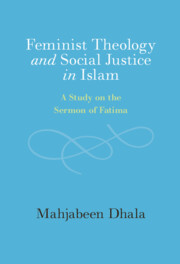11 results

Feminist Theology and Social Justice in Islam
- A Study on the Sermon of Fatima
-
- Published online:
- 27 January 2024
- Print publication:
- 01 February 2024
Is terrorism necessarily violent? Public perceptions of nonviolence and terrorism in conflict settings
-
- Journal:
- Political Science Research and Methods / Volume 12 / Issue 3 / July 2024
- Published online by Cambridge University Press:
- 22 June 2023, pp. 521-539
-
- Article
-
- You have access
- Open access
- HTML
- Export citation
Chapter Seventeen - Cavendish Studies and the Digital Turn
- from Part V - New Directions
-
-
- Book:
- Margaret Cavendish
- Published online:
- 28 April 2022
- Print publication:
- 12 May 2022, pp 261-273
-
- Chapter
- Export citation
1 - Elián González in the New York Times
- from Part I - Conflict Discourse in Newspaper Reporting
-
-
- Book:
- Discourse, Media, and Conflict
- Published online:
- 21 April 2022
- Print publication:
- 28 April 2022, pp 19-46
-
- Chapter
- Export citation
5 - Competing Strategic Cultures of Law
- from Part II - The International Court of Justice, UK-Based Lawyers and the Jus Ad Bellum
-
- Book:
- Law, War and the Penumbra of Uncertainty
- Published online:
- 31 March 2022
- Print publication:
- 07 April 2022, pp 161-214
-
- Chapter
- Export citation
4 - Competing Interpretive Cultures of War
- from Part II - The International Court of Justice, UK-Based Lawyers and the Jus Ad Bellum
-
- Book:
- Law, War and the Penumbra of Uncertainty
- Published online:
- 31 March 2022
- Print publication:
- 07 April 2022, pp 113-160
-
- Chapter
- Export citation
How Populist are Parties? Measuring Degrees of Populism in Party Manifestos Using Supervised Machine Learning
-
- Journal:
- Political Analysis / Volume 30 / Issue 3 / July 2022
- Published online by Cambridge University Press:
- 15 October 2021, pp. 311-327
-
- Article
-
- You have access
- Open access
- HTML
- Export citation
4 - Qualitative Analysis of Maoist Strategy and Rebel Agency
- from Part II - Qualitative and Quantitative Testing
-
- Book:
- Colonial Institutions and Civil War
- Published online:
- 15 May 2021
- Print publication:
- 03 June 2021, pp 87-112
-
- Chapter
- Export citation
Structures in Crisis: A Narrative Approach to Asghar Farhadi’s Films
-
- Journal:
- Iranian Studies / Volume 53 / Issue 5-6 / December 2020
- Published online by Cambridge University Press:
- 12 January 2022, pp. 911-924
- Print publication:
- December 2020
-
- Article
- Export citation
Chapter 9 - The German Case
- from Part II - Deconstructing Marginalisation
-
-
- Book:
- A Better Future
- Published online:
- 06 September 2020
- Print publication:
- 17 September 2020, pp 197-222
-
- Chapter
- Export citation
The Authors Do Not Speak: A People’s Reading of the ASEAN Charter
-
- Journal:
- Asian Journal of Law and Society / Volume 6 / Issue 2 / November 2019
- Published online by Cambridge University Press:
- 15 June 2020, pp. 229-247
-
- Article
- Export citation

